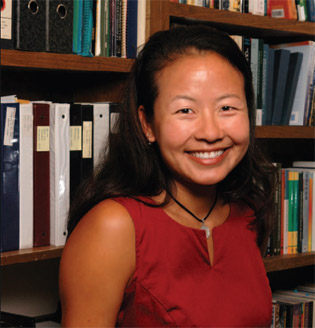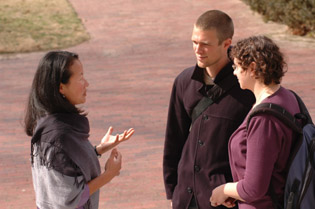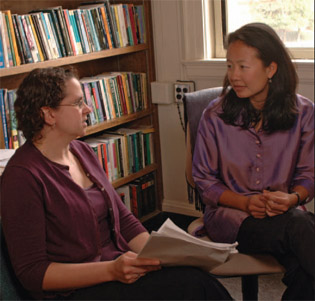

A publication of The Graduate School, University of North Carolina at Chapel Hill
On-Line Version Spring 2006
Home | Back issues | About us | The Graduate School | UNC-Chapel Hill | Make a gift
Igniting
the fire within:
Students and mentors build lasting relationships
Tucked away in a cozy, inviting second-floor office of the Alumni Building, anthropology professor Flora Lu Holt is a product of both her intense drive to learn and the inspiring educators who have mentored her along the way. The drive to learn is evident with a glance around her office; books on various cultures and pictures of her travels to far-away lands are aligned neatly on the bookshelves that line her workspace, giving testament to how far Holt will go in search of knowledge.
 |
| Anthropolgy professor Flora Lu Holt (above) understands the importance of being a mentor. On the impact of mentors, she says, "My mentors not only shaped what my profession would be, but also helped me gain a sense of self and confidence that I needed." |
 |
| Holt (below, left) builds lasting relationships with graduate students Ashley Carse (center) and Carla Norwood (right). |
| Photos
by Will Owens |
The impact of mentoring is not as obvious to the naked eye, but it has been equally important in her development as a scholar and as a person. Holt is in her third year as an assistant professor at Carolina, but her intellectual journey has spanned decades of learning from top-notch mentors in her field.
“One thing I really took away from my mentors is the pivotal role they play in students’ lives,” says Holt. “A professor teaches a group of students but mentors individuals, and it is of course that one-on-one interaction which is central.”
Like much in the academic world, mentoring is an endless, cyclical process. Holt, once an eager young student herself, was taken under the wing of nurturing professors, and she now seeks to pay it forward by providing guidance and inspiration to her own students.
“In my case, the impact of my mentors not only shaped what my profession would be, but also helped me gain a sense of self and confidence that I needed,” she says. “With my students, that is something I try to emulate as well.”
Fanning
the Flames of Scholarship
As an undergraduate studying human biology at Stanford University, Holt
was like most students her age. Her life involved long days and nights
of studying, along with the challenges of balancing academic obligations
with a social life. As an ambitious young scholar, Holt’s ultimate
goal was to produce high-quality work that would earn her good grades
and — of equal importance — respect from her classmates and
professors.
Like many young students, Holt looked up to her college professors as models of what scholars should be. Consequently, these professors helped forge a roadmap for the entire approach to her career and taught her about both the scholarly and personal aspects of academia.
These lessons were learned through years of camaraderie and tutelage, but it all started with a single class assignment for a course on the human ecology of the Amazon.
“I just needed a topic for a term paper,” recalls Holt, referring to the subject that has been the focus of her research ever since. “I remember calling Rainforest Action Network, a non-governmental organization based out of San Francisco, and they told me about this group of people facing potential ethnocide and a massive change in the Amazon rain forest.”
That group of people, as it turned out, was the Huaorani, an indigenous population numbering a few thousand individuals. Holt was fascinated by the unique pressures globalization posed for the Huaorani, so she decided to explore the topic as a class assignment.
"It’s funny — it all just started as a paper, and it was an A minus paper, so it wasn’t even all that spectacular, but it wound up leading me down a different road than I had planned,” Holt says.
The paper, spectacular or not, caught the attention of her professors, Nickie Irvine and William Durham. They saw Holt as an academic diamond in the rough, with the intellectual ability to bring up more great questions than could be answered with current knowledge. Irvine took particular notice of Holt’s genuine interest in the subject and encouraged her to go into the field to try and answer them.
“I remember asking Nickie, ‘You mean actually go to Ecuador and into the Amazon?’” Holt recalls. “And she challenged me, ‘Well, yeah. I can help you get a grant through the Undergraduate Research Opportunities office and you should go try to answer some of these questions you brought up in your paper.’”
For Holt, this signified her first understanding of what a mentor is capable of cultivating.
“It really made me realize that everyone comes to academia or their profession with some sort of personal blocks or limits that they set on themselves,” she says. “One of the things they did was to help me see what sort of blocks existed and what assumptions I had that were constraining me and saying, ‘Well, let’s look at that. Is that something that you really couldn’t do?’”
Holt found out, of course, that she could do it.
She recalls not really believing she was actually going to Ecuador up until the point of boarding the plane, but the trip was enough to open her eyes to the value of first-hand experience in the field.
“Without playing a role in primary research, it’s harder to think critically about your subject, and that’s something I don’t know that I would have been able to find if I hadn’t received that early support from a mentor,” says Holt.
Fuel to the Fire
The research interest Holt discovered as an undergraduate grew into a lifelong passion with the encouragement of her graduate school mentor at Carolina.
Holt first attended graduate school at Duke University as a James B. Duke Fellow because Duke was able to offer more funding at the time than Carolina.
“This was prior to UNC Chapel Hill having the Royster Fellowships,” Holt says. “UNC wasn’t competitive in terms of getting graduate students because they just couldn’t offer them a competitive stipend.”
But Holt recalls her graduate work at Duke as tedious and menial, with very little acknowledgment or guidance from her advisor.
“I just sort of accepted that as part of the graduate experience,” she says.
After her first semester at Duke, Holt felt uninspired and realized she needed a change of scenery.
Her decision to transfer brought her to Carolina, where she was eager to take advantage of UNC Chapel Hill’s interdisciplinary environmental program and to work with Bruce Winterhalder, the former department chair and professor of anthropology from 1979 to 2002.
“I sat down and started talking with him and had this mindset where I was just willing to be a grunt,” Holt says.
She was surprised to find, however, that that would not be the case. Winterhalder asked to hear what Holt was interested in and proposed to co-author a paper with her. It was much more similar to the enthusiastic mentoring she had experienced at Stanford.
“That just blew my mind,” Holt recalls. “It established a level of interaction that was more than just your typical advisor-student relationship. It showed that he was respecting my ideas and what I had to contribute.”
Winterhalder had learned about Holt from William Durham, an old colleague, and recalls being happy to give her guidance once she transferred to Carolina.
“I think good mentoring is a mix of intense authority tempered by equally intense friendship,” Winterhalder says. “It was this friendship that I tried to bring to all of my discussions with Flora.”
Winterhalder attributes this nurturing approach to his own experiences with mentors when he was a young scholar. He was a product of independent study programs in the Honors College at the University of Oregon and later at Cornell University, where he earned his master’s and doctorate. At each place, he was able to cultivate dynamic relationships with professors who offered guidance and support.
Through this mentoring, Winterhalder was able to develop his interests and share them with faculty, and, in both situations, he learned the importance of having mentors who took interest in his academic and personal development.
“I knew from them what I wanted to pass on to my own advisees,” says Winterhalder, who clearly enjoys his role as a mentor. “There is a strong sense of continuity to mentoring, a repayment if you will, and there is a general acceptance that if you really enjoy your work you want to share it with others who feel the same way so that, hopefully, they will carry it on in different ways and long after you.”
Under Winterhalder’s tutelage, Holt was able to freely pursue her interests in research issues surrounding the Huaorani. As a professor and researcher, she has continued to visit South America at least once a year and has expanded her research to include four other indigenous populations in the Amazon.
Passing the Torch
 |
| Holt (above, right) plays an active role in students' lives by drawing on lessons learned from her own mentors. One of Holt's students is Royster Fellow Carla Norwood (above, left). |
Photos
by Will Owens |
Holt says that in her current position at UNC Chapel Hill she has employed the same approach that each of her mentors used to cultivate her own interests. In this way, the cycle of mentoring continues.
One student she has taken a keen interest in is Caroline H. and Thomas S. Royster Fellow Carla Norwood, a doctoral student in the Curriculum in Ecology. Along with another fellow graduate student, Norwood co-directed a participatory project called Little Tennessee Perspectives, which focuses on rural community identity and action in the face of growth.
Norwood first met Holt in an ecology course required of first-year students in her program, and she has since taken several other classes taught by Holt.
“Flora has always been exceptionally supportive of my academic goals,” says Norwood. “This support has been very important to me in building the confidence to pursue some non-traditional projects and research that would have probably sounded a bit far-fetched to many advisers.”
Apart from acting as a teacher, Holt has taken an active role as an advocate for Norwood, writing many letters of support for various grants and applications. But even beyond that, Norwood says, Holt has become a friend.
“Through her support of my research interests and investment in our relationship, Flora has enabled me to plan, fund and co-direct a substantial research project that hopefully will lay the foundation for my work after graduation,” says Norwood.
Holt says she believes that being connected to students’ interests requires mentors to balance academic responsibilities and fostering intellectual growth. This demands that they be cognizant and sensitive to the unique aspects of each student’s personal experience.
This dedication to individual mentoring has also served to attract top scholars to Carolina.
Ashley Carse, who is in his second year of graduate studies in the anthropology department, says it is unlikely that he would have ended up at Carolina if Holt had not recruited him.
“I had decided to go to school elsewhere but, on her invitation, I decided to visit,” says Carse. “Dr. Holt has done everything possible to support me academically, including writing a number of letters of recommendation when I’ve applied for funding outside of the university, and she has encouraged me to think about what kind of anthropologist I would like to be.”
Holt is also on the Board of Faculty for the Royster Society of Fellows, where she acts as a faculty mentor to Royster Fellows as part of the interdisciplinary mentoring program established to facilitate broader research and methodological collaboration among students. It is a position she enjoys because, as a former Royster Dissertation Fellow herself, she is able to identify with students across fields who are eager to excel in their research.
An Enduring Flame
Holt has learned through her experiences as both a student and mentor that the relationship is a special one that extends beyond work and does not end upon graduation.
“The mentors I have had, honestly, they’ve become like family,” says Holt. “I’ve watched my advisers’ kids grow up, I’ve spent a lot of time over at dinners with them, so it’s more than just a professional relationship.”
According to Holt, it is this long-term connection that differentiates a mentor from a more traditional adviser.
“When you are a mentor and your students graduate, you don’t get rid of them, and their problems continue to be your problems,” says Holt, who adds that she still calls Winterhalder when she has a question or if she is frustrated by something. “You never leave that relationship because it isn’t determined by the length of a program or the completion of a degree. It’s that larger, lifelong commitment.”
As a vital part of the Carolina community, Holt takes that commitment seriously and hopes that current students like Norwood and Carse will do the same when eager young students someday seek their inspiration and guidance.
In that way, the efforts of Holt and other mentors in every department across campus are an investment in future scholars within their fields and in the collegial academic culture that makes Carolina such a special place.
- Daniel Johnson
© 2006, The Graduate School, The
University of North Carolina at Chapel Hill
All text and images are property of The Graduate School
at the University of North Carolina-Chapel Hill. Contact Sandra Hoeflich
at shoeflic@email.unc.edu
to request permission for reproduction.
Contact Deborah Makemson at makemson@email.unc.edu if you have technical problems with this Web site.